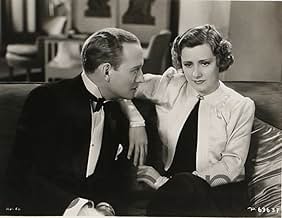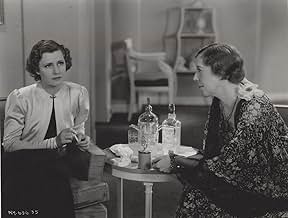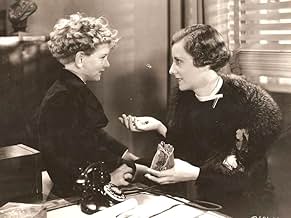Adicionar um enredo no seu idiomaA prison reformer and a controversial judge fall in love and have a child out of wedlock.A prison reformer and a controversial judge fall in love and have a child out of wedlock.A prison reformer and a controversial judge fall in love and have a child out of wedlock.
- Direção
- Roteiristas
- Artistas
- Prêmios
- 2 vitórias no total
J. Carrol Naish
- Dr. Sorelle
- (as J. Carroll Naish)
Rafaela Ottiano
- Mrs. Feldermans
- (as Rafaella Ottiano)
Wally Albright
- Mischa Feldermans
- (não creditado)
Margaret Armstrong
- Miss Jones
- (não creditado)
Irving Bacon
- Waiter
- (não creditado)
May Beatty
- Nurse
- (não creditado)
- Direção
- Roteiristas
- Elenco e equipe completos
- Produção, bilheteria e muito mais no IMDbPro
Avaliações em destaque
"Ann Vickers" is an adaptation of Sinclair Lewis' book about an unwed social worker who becomes pregnant during World War I and is subsequently abandoned by her lover. It is a valuable social commentary on the mores and folkways of the time (1933) and explores the double standard then existent that condemned a woman for `loose living' while exonerating a man. The most interesting aspect of the film to me was the fact that it was almost a mirror's image of the sea change that took place in morals during 1920's in the aftermath of World War I.
RKO couldn't have picked a better actress to play the part of Ann Vickers. Irene Dunne was young, sensitive, brave, intelligent everything the `modern woman' of the day was supposed to be. Her early professional career was marked by a series of skillfully done tearjerkers of which "Ann Vickers" is one of the better ones.
I highly recommend this movie. Walter Huston did a fine job as Ann's second love, and the man who restored her faith in a loving relationship. It's well directed and filmed and is a wonderful insight into life in the U.S. from just after World War I up until the middle of the Great Depression.
RKO couldn't have picked a better actress to play the part of Ann Vickers. Irene Dunne was young, sensitive, brave, intelligent everything the `modern woman' of the day was supposed to be. Her early professional career was marked by a series of skillfully done tearjerkers of which "Ann Vickers" is one of the better ones.
I highly recommend this movie. Walter Huston did a fine job as Ann's second love, and the man who restored her faith in a loving relationship. It's well directed and filmed and is a wonderful insight into life in the U.S. from just after World War I up until the middle of the Great Depression.
Only three years into her Hollywood career (after the initial misstep of "Leathernecking" (1930), Irene Dunne shines in this pre-Code drama. Her portrayal of Sinclair Lewis' "Ann Vickers" is complex, layered and multi-faceted. She is a modern woman and she is determined to change the world as Edna Mae Oliver's character states "if it takes her all winter". But the world almost breaks her. She is impregnated and then emotionally abandoned by Bruce Cabot's cad "Lafe", sent to work in a Purgatory of a women's prison, and finally saved by the love of Walter Huston's Judge Barney Dolphin. In him, she has met her equal--morally, intellectually, and emotionally. Their love is here to stay, as we see when she not only proudly bears their son out of wedlock but stands by him when he is sent to prison on political corruption and graft charges trumped up by his opposition. She too suffers in that she loses a top-tier professional post and must makes ends meet by writing freelance newspaper articles. However, she is undaunted and toughs it out until such time that Barney is paroled and reunited with her and their young son. It is so refreshing to see Dunne in this early role, so far removed from both the screwball comedy and perfect wife and mother roles she would play in the middle and latter phases of her long career. We mourn with her the loss of her first child, the death of whom is ambiguously depicted as coming about by abortion. We rejoice in her finding her soulmate, Barney and cheer them for their unaffected love and affection and the joy they express over their impending parenthood. While this is a "weepie", the Queen of which she would become, Dunne's performance is superior to that of her similar roles of this era. Her talent is just as complex and strong as that of her character and she inhabits the role exquisitely.
It seems ridiculous to us now that this was so controversial at the time and put the censors into a wild uncontrollable rage. Perhaps that's because it doesn't quite feel like an early thirties movie. The acting, the production and certainly the story seem much more modern.
Taken out of the context of its age, it's a fairly ordinary plot. There's no doubt it is extremely well made and but at the end of the day, it's just a story about an ordinary social worker. It's not something that you can get too excited about or want to watch again. Plenty of early thirties pictures are still entertaining as stand alone movies today - this however is one of those which is only interesting as a presentation of the morality, the attitudes, prejudices and constraints of the time.
Unlike some other "social injustice movies" of the time, this doesn't use an emotional sledgehammer to get its point across. Whilst that makes this feel more modern, if you love that old sensationalist approach such as used in NIGHT COURT or SAFE IN HELL you might find this a little bland and disappointing.
Taken out of the context of its age, it's a fairly ordinary plot. There's no doubt it is extremely well made and but at the end of the day, it's just a story about an ordinary social worker. It's not something that you can get too excited about or want to watch again. Plenty of early thirties pictures are still entertaining as stand alone movies today - this however is one of those which is only interesting as a presentation of the morality, the attitudes, prejudices and constraints of the time.
Unlike some other "social injustice movies" of the time, this doesn't use an emotional sledgehammer to get its point across. Whilst that makes this feel more modern, if you love that old sensationalist approach such as used in NIGHT COURT or SAFE IN HELL you might find this a little bland and disappointing.
Lackluster romantic drama with feminist elements. Basically it's Irene Dunne spouting off about wanting to have her own career and being involved in relationships with douchebags. All of the success she has career wise is ultimately attributed to a man and the film's message seems to be that a woman's happiness only comes from the love of a man, so I really don't see where feminists are supposed to find much to love about this film. The brief middle part of the film dealing with the brutal goings-on at a women's prison are most interesting. They should've made an entire film of that. The rest is forgettable. The cast is fine. No standouts. Edna May Oliver is wasted, which is just criminal.
9cng4
This is what a woman's film ought to be in this era, not just 70 years ago. The Ann Vickers character is a strong woman devoted to her career and to those who depend on her at the women's prison. She is not without her flaws as any hero or protagonist, but she overcomes so many obstacles and definitely has control over her life. What has happened to strong and complex female roles in modern motion pictures? This movie is well acted, well-written and has a tremendous message. I recommend it to anyone who can get their hands on it, as I believe it is still not available on video. It ranks up there with Norma Shearer's character Jerry in "The Divorcee" as far as a well-developed complex strong female characters. We need more movies depicting our gender this way not just as sex objects but as sexual subjects, with career goals and sex drives. Watch this movie!
Você sabia?
- CuriosidadesSome objections were made by the Hays Office concerning the plot of the first draft of the screenplay, where Ann marries Captain Resnick and then has an affair with Barney. The plot was changed to Ann being seduced by the Captain with the offense somehow deemed less if only one of the parties in the adulterous affair is married. No reference is made about any abortion in the trip to Havana, and in the released print the cause of death of Ann's baby girl is never mentioned. RKO applied for an "Approved" certificate in 1935, when the production code was more rigorously enforced, but they were informed that no certificate would be given because of the film's attitude towards adultery.
- Erros de gravaçãoAlthough the first part of the picture takes place in 1918, all of Irene Dunne's hairstyles and clothes are strictly in the 1933 mode, and continue as such through the decade of the 1920s which follows.
- Citações
Barney Dolphin: [last lines]
Matthew Dolphin: Who are you?
Barney Dolphin: Well, son, i refuse to answer without advice of counsel.
- Cenas durante ou pós-créditosThe opening credits are printed in the pages of the novel. They are revealed by a man's hand opening the book and turning the pages.
- Trilhas sonorasSmiles
(1917) (uncredited)
Music by Lee S. Roberts
Lyrics by J. Will Callahan
Played by a band for dance music at the Lorlears Hook Settlement House
Whistled by Sam Hardy
Danced by Sam Hardy and Helen Cromwell and other couples
Principais escolhas
Faça login para avaliar e ver a lista de recomendações personalizadas
Detalhes
- Data de lançamento
- País de origem
- Idioma
- Também conhecido como
- Sinclair Lewis' Ann Vickers
- Locações de filme
- Empresa de produção
- Consulte mais créditos da empresa na IMDbPro
Bilheteria
- Orçamento
- US$ 303.000 (estimativa)
- Tempo de duração1 hora 16 minutos
- Cor
- Proporção
- 1.37 : 1
Contribua para esta página
Sugerir uma alteração ou adicionar conteúdo ausente

Principal brecha
By what name was Ann Vickers (1933) officially released in Canada in English?
Responda
































